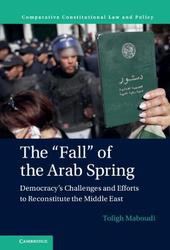
|
The 'Fall' of the Arab Spring: Democracy's Challenges and Efforts to Reconstitute the Middle East
Hardback
Main Details
| Title |
The 'Fall' of the Arab Spring: Democracy's Challenges and Efforts to Reconstitute the Middle East
|
| Authors and Contributors |
By (author) Tofigh Maboudi
|
| Series | Comparative Constitutional Law and Policy |
|---|
| Physical Properties |
| Format:Hardback | | Pages:350 | | Dimensions(mm): Height 236,Width 157 |
|
| ISBN/Barcode |
9781316519325
|
| Classifications | Dewey:320.9174927 |
|---|
| Audience | |
|---|
| Illustrations |
Worked examples or Exercises; Worked examples or Exercises
|
|
Publishing Details |
| Publisher |
Cambridge University Press
|
| Imprint |
Cambridge University Press
|
| Publication Date |
7 April 2022 |
| Publication Country |
United Kingdom
|
Description
Constitutional bargains are seen as cornerstones of democratic transitions in much of the world. Yet very few studies have theorized about the link between constitution-making and democratization. Shifting the focus on democratization away from autocratic regime break down, this book considers the importance of inclusive constitution-building for democratization. In this pathbreaking volume, Tofigh Maboudi draws on a decade of research on the Arab Spring to explain when and how constitutional bargains facilitate (or hinder) democratization. Here, he argues that constitutional negotiations have a higher prospect of success in establishing democracy if they resolve societal, ideological, and political ills. Emphasizing the importance of constitution-making processes, Maboudi shows that constitutions can resolve these problems best through participatory and inclusive processes. Above all, The 'Fall' of the Arab Spring demonstrates that civil society is the all-important link that connects constitutional bargaining processes to democratization.
Author Biography
Tofigh Maboudi is an Assistant Professor of Political Science at Loyola University Chicago, who has studied Arab constitutions and constitutionalism for over a decade. Maboudi's research focuses on comparative constitutional studies, democratization, authoritarianism, and Middle East politics. His research has appeared in several journals including The American Political Science Review, Comparative Political Studies, and Political Research Quarterly. He is the co-author of Constituents before Assembly: Participation, Deliberation, and Representation in the Worldwide Crafting of New Constitutions (2017). Professor Maboudi has been a Visiting Scholar at the American Bar Foundation.
Reviews'A democratic constitution is increasingly understood not only as one that provides for democratic structures but also one that is written democratically. But what does that mean, especially in places where the rules of democratic politics themselves are up for debate? Drawing on extensive empirical research, Tofigh Maboudi probes how civil society should best be included-and he bases his inquiry not simply by showing what can go right but also by probing what can go wrong. The resulting work provides richness and rigor to a burgeoning field.' Nathan J. Brown, Professor, George Washington University and Carnegie Endowment for International Peace 'Waves of constitution-making are rare. After the revolutions of 1848 and the East European transitions of 1989, the Arab Spring from 2011 onwards offers the most recent example. In this path-breaking book, Tofigh Maboudi argues that both the success of the Tunisian process and the failures of ten other Arab nations to adopt democratic constitutions can be explained by features of the constitution-making process, notably the presence or absence of inclusion and participation. In analyses that are both depressing and illuminating, Maboudi shows that the Arab Spring was a tragedy that also created a repertoire for change.' Jon Elster, Robert K. Merton Professor of the Social Sciences, Columbia University 'The Arab Spring uprisings generated hope that new constitutional orders would yield more democratic politics. The ensuing decade brought no shortage of constitutional change, but democratic aspirations have (mostly) been disappointed. Maboudi shows us how participation in constitutional moments shapes their outcomes, emphasizing not just how participation unfolds but who is, and is not, involved. The result is a keener appreciation of the role of civil society organizations for whether democratic ambitions are realized. This is an essential book for readers seeking to understand prospects for democracy in the 21st Century.' John Carey, Wentworth Professor in the Social Sciences, Dartmouth College
|